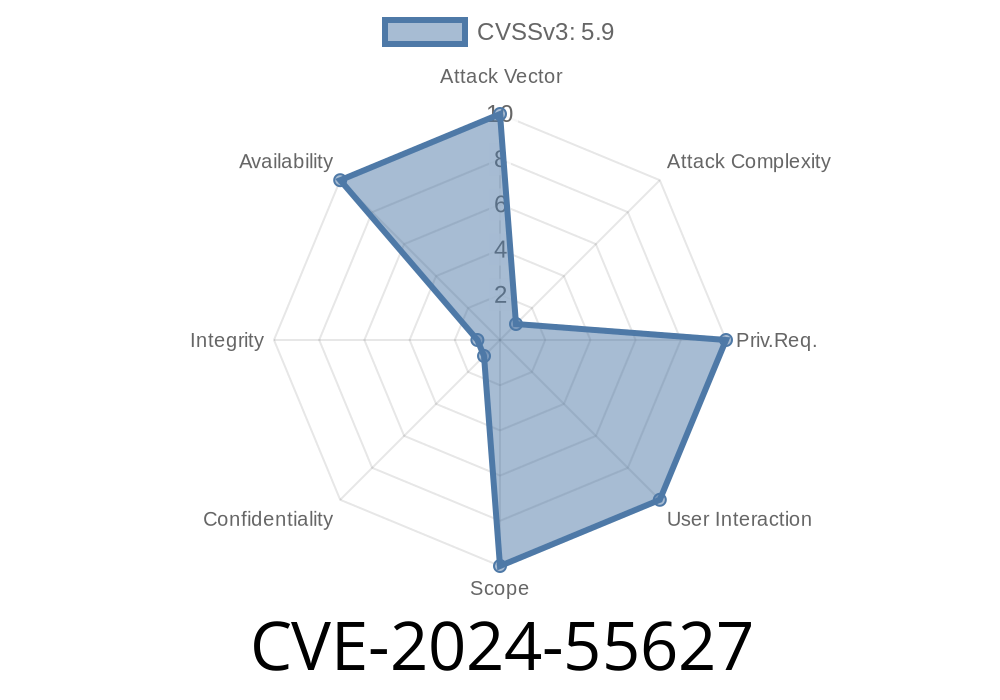Suricata is an open-source network Intrusion Detection System (IDS), Intrusion Prevention System (IPS), and powerful Network Security Monitoring engine that many security teams and SOCs rely on daily. But even the best systems can have dangerous bugs. In June 2024, a serious vulnerability—CVE-2024-55627—was revealed. Here’s an easy-to-understand, exclusive deep dive into what happened, why it’s so dangerous, and how it can be exploited on unpatched systems.
What is CVE-2024-55627?
CVE-2024-55627 is a buffer overflow vulnerability in Suricata, triggered by a specially crafted TCP stream. The underlying issue is an unsigned integer underflow during buffer size calculation, which then causes memset to write into much more memory than intended—all with zeros—completely breaking memory safety and opening the door to crashing Suricata or even running arbitrary code.
Technical Details
Let’s break down what’s happening step by step.
The Initialization Bug
In the TCP stream processor, Suricata calculates how much buffer it needs to allocate for the incoming session. Due to a miscalculated subtraction (unsigned underflow), this size calculation can go negative. In C, an unsigned integer underflow wraps around to a massive positive value, like - 1 = xFFFFFFFF.
When Suricata tries to zero-fill this buffer with memset, it ends up writing *tons* of zeros — way beyond the real buffer size, straight into adjacent memory, possibly even over important program structures.
Here’s a simplified version of what happened
unsigned int size = end_seq - start_seq; // 'end_seq' < 'start_seq' triggers underflow!
char *buffer = malloc(size);
if (buffer) {
memset(buffer, , size); // Oh no—size is huge!
}
If start_seq is larger than end_seq in an incoming TCP stream (and that’s up to the attacker), size becomes a huge value—*unsigned integer underflow*—and memset overruns memory.
Reproduction Through a Crafted TCP Stream
An attacker can carefully craft TCP packets so that the sequence numbers intentionally cause this underflow. When Suricata processes the data, the bug is triggered.
Remote Denial of Service (DoS): Suricata process crashes due to memory corruption.
- Remote Code Execution (Hypothetical): If combined with other memory vulnerabilities, it’s theoretically possible.
Simple Proof-of-Concept (PoC)
Here's a simple exploit outline in Python using the scapy library (for research/testing on your own infrastructure):
from scapy.all import *
target_ip = "YOUR_SURICATA_IP"
target_port = 80
# Craft an evil TCP packet with 'end_seq' intentionally less than 'start_seq'
pkt = IP(dst=target_ip)/TCP(dport=target_port, sport=12345, seq=100, ack=500, flags="PA")/"malicious_payload"
send(pkt)
*Do not run this code on networks you do not own!*
This bug can be triggered by *anyone* who can send TCP packets to the monitored network interface.
- Memory bugs like this are a gateway to more sophisticated exploits, like privilege escalation or remote shell access.
Update immediately!
- Download: https://suricata.io/download/
- Release notes: https://github.com/OISF/suricata/releases/tag/suricata-7..8
Workaround: If you cannot update instantly, ensure Suricata runs with limited privileges, and restrict access to your IDS from untrusted networks.
Original Advisory:
https://nvd.nist.gov/vuln/detail/CVE-2024-55627
Official Patch Announcement:
https://github.com/OISF/suricata/releases/tag/suricata-7..8
Project Homepage:
Conclusion
CVE-2024-55627 is a stark reminder that critical open-source tools like Suricata must be kept up-to-date and monitored for vulnerabilities. This bug is easy to trigger, remotely exploitable, and allows attackers to crash your IDS with just a few packets—or potentially compromise your network further. Patch now, monitor advisories, and keep your defenses strong.
Timeline
Published on: 01/06/2025 18:15:22 UTC
